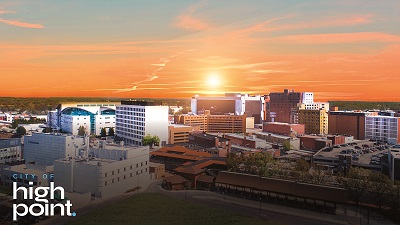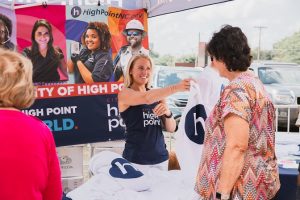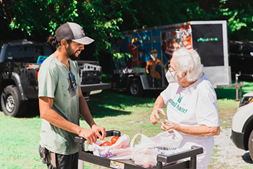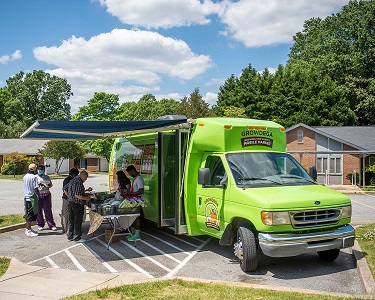2024 All-America City – High Point, NC

High Point, renowned as the Home Furnishings Capital of the World, has a storied history dating back to the early 1900s, when it emerged as a hub for furniture production. Today, it remains vibrant, boasting prestigious institutions like High Point University and events like the High Point Market. With a population nearing 115,000, the city preserves a small-town ambiance while embracing progress and innovation.
At the same time, High Point understands that investments must prioritize its people. This commitment to equity is evident through initiatives such as city rebranding, strategic planning, and the establishment of a reparations commission to rectify historical injustices. Looking forward, High Point aims to cultivate an inclusive environment where every resident can thrive, acknowledging the pivotal roles of creativity, innovation, and collaboration in shaping the city’s future.
High Point City Rebrand
 The rebranding of High Point aimed to cultivate civic pride and inclusivity by addressing its outdated public image. The city collaborated with CivicBrand to refresh its identity, engaging diverse voices and ensuring broad community ownership.
The rebranding of High Point aimed to cultivate civic pride and inclusivity by addressing its outdated public image. The city collaborated with CivicBrand to refresh its identity, engaging diverse voices and ensuring broad community ownership.
High Point faced challenges of geographical fragmentation and lack of civic buy-in, hindering active participation in democratic processes. To address this, the rebrand focused on crafting a cohesive narrative that transcended divides and aimed to create a ‘seamless city’ where residents from all backgrounds felt connected and empowered.
The Brand Taskforce, comprising key stakeholders, conducted extensive research and community engagement initiatives. Over 12 months, the Taskforce, alongside a team from CivicBrand, conducted research at numerous ‘activation events’ across High Point’s geography, including businesses, breweries, nonprofits, after-school facilities, and co-working spaces. The Taskforce also created more than ten focus groups for roundtable discussions and hosted a variety of conversations with residents and citizens via podcast and documentary recordings that captured both the progress and process of the strategic rebranding. This extensive community engagement resulted in four brand pillars:
- High Point is the Center of Design
- High Point is a Movement of Makers
- High Point is Inspiring Creatives
- High Point is Kind & Inclusive

These pillars will serve as a litmus test to ensure each decision preserves the city’s collectively crafted identity. As a result of these efforts, High Point residents now feel a personal connection to the city’s brand, leading to increased participation in civic events across diverse communities.
Thrive HP
 In response to the racial unrest of 2020, City of High Point leaders spearheaded the creation of a groundbreaking minority entrepreneurial initiative aimed at addressing systemic disparities through reparative resource allocation.
In response to the racial unrest of 2020, City of High Point leaders spearheaded the creation of a groundbreaking minority entrepreneurial initiative aimed at addressing systemic disparities through reparative resource allocation.
Historical racial segregation and discriminatory practices across the nation and in High Point have perpetuated economic disparities, limiting minority access to capital and opportunities. Thrive addresses these barriers by providing educational initiatives and mentorship programs and by advocating for minority representation in leadership roles. By facilitating networking opportunities, Thrive aims to bridge gaps in access to influential networks and foster a more inclusive business landscape.

Thrive officially launched in August 2021, garnering support from local financial institutions and registering 577 members. Through partnerships with over ten community organizations, Thrive hosts annual summits, workshops, and the Thrive Grant program, offering grants of up to $15,000 to empower entrepreneurs and stimulate economic growth with the goal of reducing disparities.
Thrive members also benefit from their partnership with the Chamber, gaining access to established programs and events like Leadership High Point and the esteemed State of the City address. This collaboration enables members to stay informed about local trends and news directly from city staff and elected officials, strengthening their ties to the broader business community.
Thrive’s holistic approach fosters collaboration, increases access to resources, and cultivates a supportive ecosystem, inspiring future generations of entrepreneurs from diverse backgrounds.
The Greater High Point Food Alliance
 In 2015, High Point ranked as the number one metropolitan area in the United States for food hardship. In response, local High Pointers established the Greater High Point Food Alliance (GHPFA) to tackle food insecurity.
In 2015, High Point ranked as the number one metropolitan area in the United States for food hardship. In response, local High Pointers established the Greater High Point Food Alliance (GHPFA) to tackle food insecurity.
GHPFA engaged in public discourse and increased neighborhood participation to identify upstream issues such as:
- Lack of access to fresh foods
- Lack of food preparation knowledge
- Lack of community voice in solution identification
In seven years, the city improved from being number one in the ranking of food hardship to 14th, showcasing the tangible results of dedicated community engagement.
- The Growing High Point & Adopt-A-Lot program transforms vacant lots into urban farms, leasing them from the city for $1.00/year.
- The Farmers in Training program trains individuals in urban farming and provides startup cost support.
- Growdega operates a refrigerated produce truck traveling to food deserts weekly.
- High Point Farmer’s Market incentivizes SNAP beneficiaries to purchase from local farmers by providing tokens worth twice their spending.
- Strategic food pantries and community gardens address food deserts and provide fresh produce.
- GHPFA’s Food Finder app offers resources such as food pantries, community meals, and mental health providers.
- GHPFA became an Emergency Food Provider during COVID-19, distributing funds and essential supplies to local food pantries and schools.
- Homegrown Heroes educates families on nutritious food preparation.
- Youth Food Summits and library programs engage students in nutrition education and gardening.
- YWCA’s Teaching Kitchen offers classes and partnerships for adult food education and preparation.
- Walk to the Store Day spreads awareness by challenging community members to walk to the nearest grocery store from food deserts.
- The Growing Towards Leadership program offers leadership development for local food providers.
- The Food Security Fund program provides small grants for community food projects.
In seven years, the city plummeted from the top spot to 14th in the rankings for food hardship, showcasing the tangible results of dedicated community engagement.

Some Related Posts
Thank You to Our Key Partners



